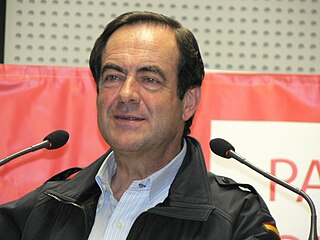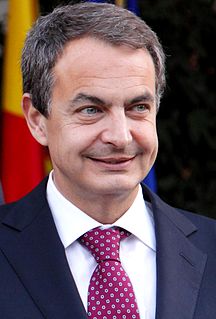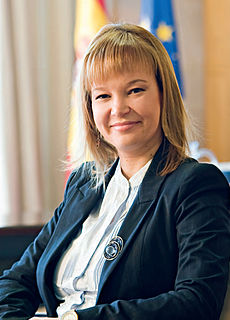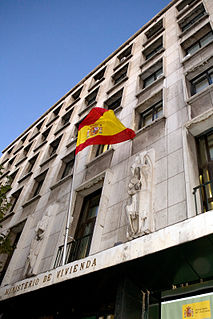
José Bono Martínez is a Spanish politician, born in Salobre, Albacete. A member of the Spanish Socialist Workers' Party (PSOE), he was the President of the Congress of Deputies during the 9th Legislature. Before that, he was the Minister of Defence of Spain from April 18, 2004, in the Government chaired by José Luis Rodríguez Zapatero. He left his ministerial post on April 7, 2006, and was replaced by former Minister of Interior, José Antonio Alonso. Bono had previously served as President of the Autonomous Community of Castile-La Mancha from June 6, 1983 to April 17, 2004. During his period as a member of the Government, José Bono was involved in certain controversial events, some of them regarding his role as Minister of Defence, and others regarding his membership of the Socialist Workers' Party, the most significant of them being the detention of two members of the Popular Party (PP) who were participating with him in a popular demonstration, after they had allegedly attempted to assault him. He was elected President of the Congress of Deputies on April 1, 2008.

Manuel Chaves González is a Spanish politician of the Spanish Socialist Workers' Party (PSOE). Since 2009 he has served as the Third Vice President of the Spanish Government, until 2011, and between 2000 and 2012 as the Chairman of PSOE. From 1990 to 2009 he was the President of the Regional Government of Andalusia. He is a trustee of the Fundacion IDEAS, Spain's Socialist Party's think tank. On 17 February 2015, together with former President of Andalusia, José Antonio Griñán, was implicated in the ERE case, a huge corruption scandal in the region.
José Luis Rodríguez may refer to:

José Antonio Alonso Suárez was a Spanish Socialist Workers' Party (PSOE) politician, cabinet minister and judge. He was born in León.

Carme Maria Chacón Piqueras was a Spanish lawyer, lecturer and politician who was Minister of Defence from 2008 to 2011 in the cabinet led by Spanish Prime Minister José Luis Rodríguez Zapatero.
ETA's 2006 "permanent ceasefire" was the period spanning between 24 March and 30 December 2006 during which, following an ETA communiqué, the Spanish government, led by José Luis Rodríguez Zapatero on one side, and the militant group on the other, engaged in talks as a means to agree on a formula to voluntarily disband the latter. It was terminated as a result of the 2006 Madrid Barajas International Airport bombing.

Celestino Corbacho Chaves is a Spanish politician, who was Member of Catalan Parliament and Minister of Labour and Immigrations in José Luis Rodríguez Zapatero cabinet between 2008 and 2010.

The Autovía A-80, also known as Autovía del Suroccidente, a proposed highway in Asturias, Spain.

José Luis Rodríguez Zapatero is a Spanish politician and member of the Spanish Socialist Workers' Party (PSOE). He was the Prime Minister of Spain being elected for two terms, in the 2004 and 2008 general elections. On 2 April 2011 he announced he would not stand for re-election in the 2011 general election and left office on 21 December 2011.

Leire Pajín Iraola is a Spanish socialist politician. She served as a minister under José Luis Rodríguez Zapatero.

Jesús Caldera Sánchez-Capitán is a Spanish socialist politician. He holds degrees in political science and sociology from the Complutense University of Madrid and a law degree from UNED.He was Minister of Labor during the eighth legislature of the Spanish government (2008-2011).

The Ideas Foundation for Progress, also known as the Fundación IDEAS, is a Spanish think tank that works on political ideas and proposals for the Spanish Socialist Workers' Party (PSOE). In this regard, it integrates the foundations previously created and tied to the PSOE.

The Ministry of Housing (MIVIV) was a department of the Government of Spain responsible for proposing and carrying out the government policy on public housing and urbanism.
Events in the year 2005 in Spain.
Zapatero is a Spanish-language occupational surname literally meaning "shoemaker".
The following lists events that happened during 2008 in the Kingdom of Spain.
The following lists events that happened during 2004 in Spain.

Spain–Togo relations are the bilateral and diplomatic relations between these two countries. Togo does not have an embassy in Madrid but their embassy in Paris is accredited for Spain, but they have a consulate in Barcelona. Spain also does not have an embassy in Togo but its embassy in Accra, Ghana is accredited to this country, also has a consulate in Lomé.

José Luis Rodríguez Zapatero formed the Zapatero I Government on 18 April 2004 after being nominated by King Juan Carlos I to form a government as a result of the Spanish Socialist Workers' Party (PSOE)'s victory at the 2004 general election. It was the government of Spain from 18 April 2004 to 14 April 2008, a total of 1,457 days, or 3 years, 11 months and 27 days. Zapatero was elected Prime Minister by the Congress of Deputies on 16 April and was sworn into office on 17 April. Zapatero's first cabinet was composed mainly by members of the PSOE and its sister party, the Socialists' Party of Catalonia (PSC), as well as a number of independents. It succeeded the second Aznar government.

José Luis Rodríguez Zapatero formed the Zapatero II Government on 14 April 2008 after being nominated by King Juan Carlos I to form a government for a second term in office as a result of the Spanish Socialist Workers' Party (PSOE)'s victory at the 2008 general election. It was the government of Spain from 14 April 2008 to 22 December 2011, a total of 1,347 days, or 3 years, 8 months and 8 days. Zapatero was elected Prime Minister by the Congress of Deputies on 11 April and was sworn into office on 12 April. Zapatero's second cabinet was composed mainly by members of the PSOE and its sister party, the Socialists' Party of Catalonia (PSC), as well as a number of independents. It succeeded the first Zapatero government.













